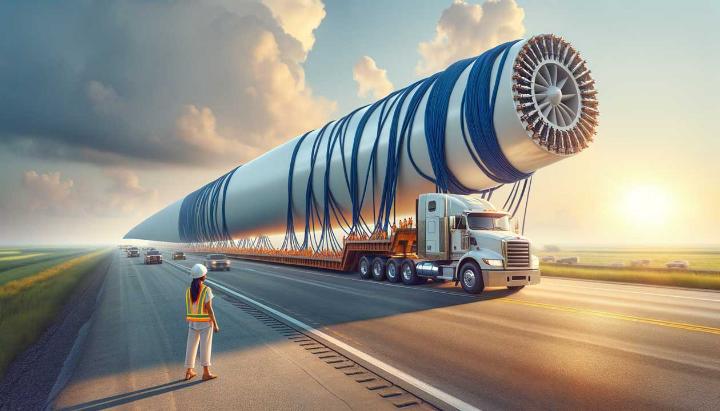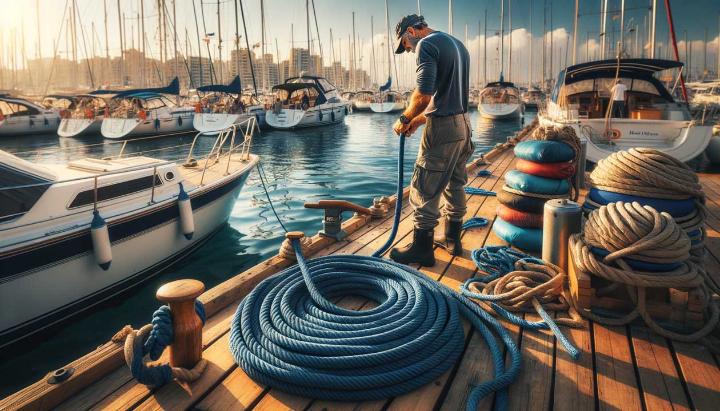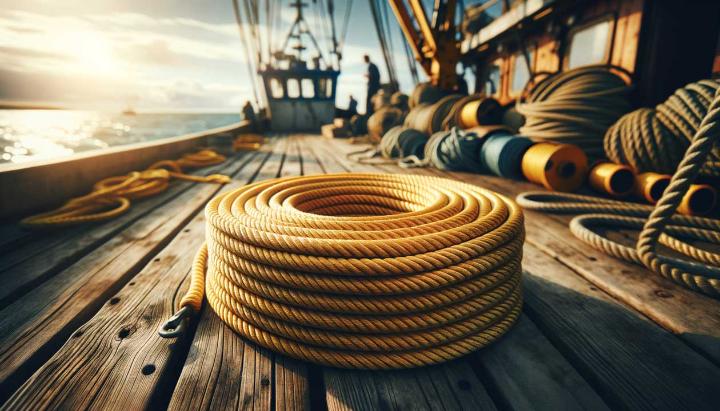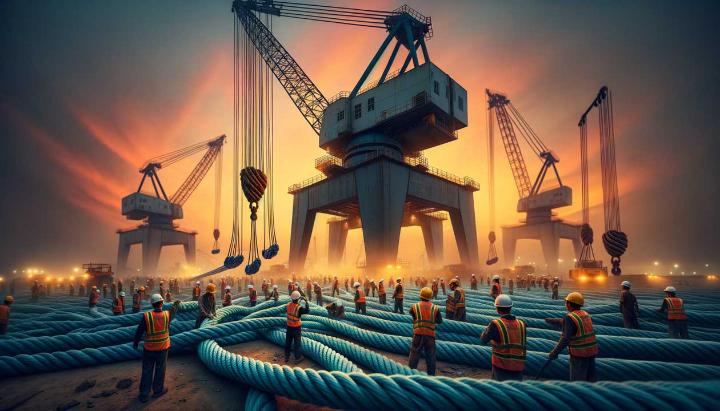Have you ever wondered what keeps a massive cargo ship securely moored during a storm, or how rescue teams safely rappel down treacherous cliffs? The answer lies in the often-overlooked world of 2-inch thick nylon and braided ropes. These robust cordages are the unsung heroes of industries ranging from maritime operations to high-stakes rescue missions.
In this eye-opening exploration, we'll uncover the top uses for 2 thick rope, revealing how these sturdy lifelines play crucial roles in our everyday lives and in the most extreme conditions. From the docks of bustling ports to the heights of adventure parks, thick nylon rope and thick braided rope are the silent guardians ensuring safety and efficiency across various sectors.
As we delve into the industrial, marine, and safety applications of these versatile ropes, you'll gain a newfound appreciation for their strength and reliability. Whether you're a seasoned professional in need of heavy-duty cordage or simply curious about the technology behind these essential tools, this guide will shed light on why choosing the right rope can make all the difference. Join us as we unravel the world of 2-inch thick ropes and discover how iRopes, with its 15 years of expertise, is revolutionising the industry with its innovative, high-quality products.
Industrial Applications of 2-Inch Thick Rope
When it comes to heavy-duty industrial tasks, 2-inch thick rope is the unsung hero of many operations. These robust ropes are the backbone of various industries, providing the strength and reliability needed for demanding applications. Let's dive into the world of industrial rope use and explore how these thick, sturdy lines keep our industries moving forward.
Heavy-Duty Uses in Construction and Transportation
In the bustling world of construction and transportation, 2-inch thick ropes are indispensable. Picture a massive crane hoisting a steel beam to the top of a skyscraper - that's where our thick ropes shine. They're the muscle behind heavy-duty lifting operations, capable of handling loads that would make lesser ropes snap in an instant.
But it's not just about lifting. These ropes are also crucial for securing large loads during transportation. Have you ever wondered how those enormous wind turbine blades stay put on the back of a truck? You guessed it - thick, industrial-grade ropes are often the answer.

Safety and Rescue Operations with Thick Rope
Beyond construction and transport, 2-inch thick ropes play a vital role in safety and rescue operations. In high-risk industries like mining, these ropes can be literal lifelines. They're used in emergency evacuation systems and for securing workers in precarious positions.
Imagine being part of a search and rescue team in a treacherous mountain range. The thick rope in your pack could be the difference between life and death for a stranded climber. It's not just about strength here - it's about trust. When lives are on the line, you need a rope you can bet your life on.
Marine and Offshore Applications
Out at sea, 2-inch thick ropes are as essential as the salt in the water. From mooring massive cargo ships to anchoring oil rigs in choppy waters, these ropes are the unsung heroes of maritime industries. They withstand the corrosive effects of saltwater and the relentless pull of ocean currents, keeping vessels and structures secure in the most challenging conditions.
Have you ever seen a tugboat guiding a massive tanker into port? That thick line connecting them isn't just any rope - it's a specially designed towing rope, capable of handling the immense forces involved in marine towing operations.
In all these applications, the choice of rope material is crucial. While traditional nylon ropes are still widely used, modern synthetic fibers like UHMWPE and Kevlar™ are revolutionizing the industry with their incredible strength-to-weight ratios and durability. To understand more about the performance of various rope types, check out our guide on marine rope essentials.
Remember, when it comes to industrial applications, choosing the right rope isn't just about strength - it's about safety, efficiency, and reliability. So next time you see a construction site or a busy port, take a moment to appreciate the hardworking 2-inch thick ropes making it all possible.
Marine and Boating Uses of Thick Nylon Rope
When it comes to marine applications, choosing the right rope can make all the difference between a smooth sailing experience and a potential disaster. Thick nylon rope has become a staple in the boating world, and for good reason. Let's dive into the unique properties and versatile uses of this marine workhorse.
Advantages of Nylon Rope for Marine Applications
As a seasoned sailor, I've come to appreciate the unparalleled benefits of thick nylon rope in various marine situations. Here's why it's become my go-to choice:
- Exceptional strength-to-weight ratio: Nylon rope offers impressive tensile strength without adding unnecessary weight to your vessel.
- Remarkable elasticity: The ability to stretch and absorb shock is crucial when dealing with the unpredictable forces of wind and waves.
- UV and saltwater resistance: Marine-grade nylon stands up to harsh sunlight and corrosive seawater, ensuring longevity in challenging conditions.
- Superior abrasion resistance: This quality is essential when your rope is constantly rubbing against rough surfaces like dock edges or rocky shorelines.
Compared to polypropylene, another common marine rope material, nylon offers better overall performance in terms of strength and durability. While polypropylene floats, which can be advantageous in some situations, nylon's versatility often makes it the preferred choice for most boating applications. If you're looking for a reliable nylon rope, check out our high tensile strength ropes.

Common Uses of Thick Nylon Rope in Boating
Now, let's explore some of the primary applications where thick nylon rope truly shines:
Anchoring Systems: When it comes to keeping your boat steady in choppy waters, a robust anchor rode is essential. Thick nylon rope, typically 1/2 inch to 3/4 inch in diameter, provides the necessary strength and elasticity to handle the constant pulling and jerking motions.
Dock Lines and Mooring: Ever tried to secure a 40-foot yacht to a dock in gusty conditions? I have, and let me tell you, having reliable dock lines makes all the difference. For boats up to 40 feet, a 5/8-inch thick nylon rope is usually sufficient, while larger vessels may require 3/4-inch or even 1-inch thickness. For more insights into choosing the right marine rope, check out our article on marine braided ropes.
Towing Applications: Whether you're helping a stranded boater or need a tow yourself, thick nylon rope is your best friend. Its shock-absorbing properties help prevent sudden jerks that could damage either vessel.
Remember, the specific thickness you'll need depends on your boat's size and the intended use. Always consult your boat's manual or a marine professional to ensure you're using the appropriate rope for your vessel and conditions.
In my years of experience on the water, I've learned that investing in high-quality, thick nylon rope is never a mistake. It's not just about functionality; it's about peace of mind knowing that your vessel is secure, whether you're docking in a crowded marina or anchoring in a secluded cove.
Have you had any memorable experiences where having the right rope made all the difference? Share your stories in the comments below – we'd love to hear from fellow boating enthusiasts!
Safety and Rescue Applications of Thick Braided Rope
When lives are on the line, the importance of a reliable, sturdy rope cannot be overstated. Thick braided ropes have become the unsung heroes in safety and rescue operations, offering a lifeline in the most challenging situations. Let's dive into the world of these robust ropes and explore how they're making a difference in emergency responses worldwide.
Types of Thick Braided Ropes for Rescue Operations
In my years as a rescue professional, I've come to appreciate the nuanced differences between various types of rescue ropes. Each has its unique strengths, tailored for specific scenarios:
- Static ropes: These are the workhorses of rescue operations, with minimal stretch that makes them ideal for rappelling and hauling systems.
- Dynamic ropes: With their ability to absorb shock, these ropes are crucial for fall arrest systems and rock climbing rescues.
- Water rescue ropes: Designed to float and resist water absorption, these are essential for swift water and marine rescues.
The material of choice? Nylon. Its combination of strength, durability, and slight elasticity makes it the go-to for most rescue scenarios. I've seen nylon ropes withstand conditions that would have shredded lesser materials in seconds. For more insights on rope durability and performance, explore our guide on selecting the right marine rope.

Key Features of Life Safety Ropes for Emergency Response
When selecting a life safety rope, there are critical features we never compromise on:
- Strength: These ropes must withstand enormous forces without fail.
- Durability: Abrasion resistance is crucial, especially in rough terrain rescues.
- Handling: A good rescue rope should be easy to grip, even when wet.
- Visibility: High-visibility colours can be a lifesaver in low-light conditions.
But how do we ensure these ropes meet the stringent requirements for emergency use? That's where NFPA 1983 comes in. This standard, set by the National Fire Protection Association, provides rigorous guidelines for life safety ropes and equipment. It's not just a recommendation; it's a crucial benchmark that can mean the difference between life and death.
One of the most critical aspects of rope selection is understanding safety factors. In simple terms, a safety factor is the ratio between a rope's minimum breaking strength and the maximum force it's expected to encounter. For rescue operations, we typically aim for a safety factor of at least 10:1. This means if we expect a maximum load of 300 kg, we'd use a rope rated for at least 3,000 kg.
Have you ever been in a situation where you had to rely on a rope for safety? Whether it's rock climbing or working at heights, understanding the importance of quality ropes can give you a new appreciation for these often-overlooked tools.
Remember, when it comes to safety and rescue applications, cutting corners on rope quality is never an option. The right thick braided rope isn't just equipment; it's a lifeline that rescue professionals and those in need depend on in the most critical moments.
Advantages of iRopes' 2-Inch Thick Ropes
When it comes to heavy-duty applications, iRopes' 2-inch thick ropes stand head and shoulders above the competition. As someone who's been in the rope industry for over two decades, I can confidently say that these ropes are a game-changer for both industrial and outdoor use. Let's dive into what makes iRopes' offerings so special.
Superior Strength and Durability
The first thing you'll notice about iRopes' 2-inch thick ropes is their incredible strength. These aren't your average ropes; they're engineered to handle extreme loads and withstand harsh conditions. Here's what sets them apart:
- Unmatched tensile strength: With a breaking strength that's up to 30% higher than standard ropes of the same diameter, iRopes' 2-inch thick ropes can handle loads that would make other ropes snap.
- Exceptional abrasion resistance: Thanks to advanced fiber technology, these ropes maintain their integrity even when subjected to constant friction and wear.
- Superior environmental resistance: Whether it's scorching sun, saltwater spray, or chemical exposure, iRopes' 2-inch thick ropes are built to last in even the most challenging environments.
I've seen these ropes in action at construction sites where they've outlasted competitors' products by months, if not years. The durability isn't just impressive; it's a game-changer for businesses looking to reduce downtime and replacement costs.

Versatility in Outdoor and Industrial Applications
What truly sets iRopes' 2-inch thick ropes apart is their incredible versatility. These ropes aren't just strong; they're adaptable to a wide range of applications:
- Marine operations: From mooring large vessels to deep-sea towing, these ropes excel in maritime environments.
- Construction and mining: The high load-bearing capacity makes them ideal for heavy lifting and securing large equipment.
- Adventure parks: Thrill-seekers can rely on the safety and durability of these ropes in zip lines and high ropes courses.
- Search and rescue: When lives are on the line, the reliability of iRopes' 2-inch thick ropes provides peace of mind for rescue teams.
I once visited an offshore oil rig that had switched to iRopes' products. The site manager couldn't stop raving about how the ropes had simplified their operations and improved safety standards. It's this kind of real-world impact that showcases the true value of these ropes.
But don't just take my word for it. iRopes offers customized solutions for specific industry needs. Whether you need a particular length, color, or coating, they've got you covered. This level of customization ensures that you're getting a rope that's not just strong and durable, but perfectly suited to your unique requirements. For more information on custom solutions, visit our customization page.
Have you ever found yourself in a situation where the quality of your rope made all the difference? Share your experiences in the comments below. And if you're in the market for top-tier, heavy-duty ropes, I can't recommend iRopes' 2-inch thick ropes enough. They're not just ropes; they're an investment in safety, efficiency, and peace of mind.
Discover the extraordinary versatility of 2-inch thick nylon and braided ropes from iRopes, crafted for durability and immense strength in various fields. Our 2 thick rope is indispensable for industrial tasks like heavy-duty lifting and securing large loads, while thick nylon rope excels in marine environments for mooring and towing. Safety and rescue operations benefit immensely from thick braided ropes, whether for high-angle rescues or fall protection systems. iRopes' 15 years of rope-making expertise in China ensures top-notch quality with fibres like UHMWPE, Technora™, Kevlar™, and Vectran™, making them reliable for demanding applications. Welcome to inquire on any of the rope you want here.
Request Your Custom Rope Solution Today
For a customised rope solution that fits your specific needs, please fill out the form above. We look forward to helping you find the perfect rope for your requirements!